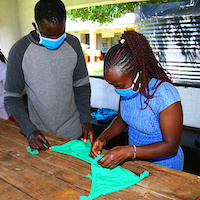Simple ways to make a better world for girls
01 October 2013
UN-watchers who support the aims and ideal of Friends of Londiani may have nodded their approval at Secretary-General Ban Ki-moon’s address at the opening of the sixty-eighth session of the General Assembly. It was far from the only theme of a wide-ranging speech but he said, “The empowerment and rights of women must be at the heart of everything we do”. The equation is simple, he added. When girls were healthy and in school; when legal frameworks and financial access supported women; when women’s lives were free of violence and discrimination, nations thrived. “Let the twenty-first century be the century of women,” he declared. This is a message that is relevant at any time. However, the timing on this occasion is especially significant. In less than two weeks, the UN celebrates the International Day of the Girl Child. The 11th of October will only be the second time this date has been set aside, which is a bit of a surprise, but the UN is certainly making up for lost time with a robust reminder that this is a day to recognise girls’ rights and the unique challenges girls face around the world — and a focus, this year, on Innovating for Girls’ Education. You can find out more at http://www.un.org/en/events/girlchild/. But, given that support for women’s and girls’ health and education is something Friends of Londiani has long promoted, we also hope you’ll take a look around this website and the FOL programmes for girls. Some of this appears on http://www.friendsoflondiani.com/projects.php, where the Alternative Rites Programme, in particular, is mentioned under the heading An end to female circumcision. A more detailed explanation of the programme can be downloaded here and a documentary on the topic appears at here. This is far from our only innovation. We have also helped to initiate the Girls for Girls campaign. This is a simple idea with a massively useful outcome: a programme to raise money to contribute to a sustainable project that will provide cheaper sanitary towels in the community. This in turn will enable more girls to go to school. These programmes, and many like them, are a reminder of both the negative and the positive aspects of women’s and girls’ lives in parts of the world today. Negative in that, as Ban Ki-moon implied, there is still much to be done. But positive too: sometimes, as with Girls for Girls, a modest gesture can do an enormous amount of good.

